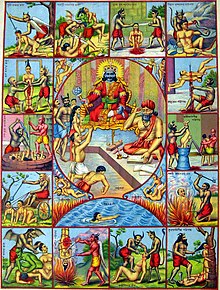
Back ناراك Arabic নরক (হিন্দু দর্শন) Bengali/Bangla Naraka (hinduismus) Czech Naraka (hinduismo) Spanish ناراکا (هندوئیسم) Persian नरक Hindi នរក (ហិណ្ឌូ) Cambodian ഹിന്ദുമതത്തിലെ നരകസങ്കല്പം Malayalam Naraka Malay ਨਰਕ Punjabi

Naraka (Sanskrit: नरक), also called Yamaloka, is the Hindu equivalent of Hell, where sinners are tormented after death.[1] It is also the abode of Yama, the god of Death. It is described as located in the south of the universe and beneath the earth.
The number and names of hells, as well as the type of sinners sent to a particular hell, varies from text to text; however, many scriptures describe 28 hells.[1] After death, messengers of Yama called Yamadutas bring all beings to the court of Yama, where he weighs the virtues and the vices of the being and passes a judgement, sending the virtuous to Svarga (heaven) and the sinners to one of the hells. The stay in Svarga or Naraka is generally described as temporary. After the quantum of punishment is over, the souls are reborn as lower or higher beings as per their merits[1] (the exception being Hindu philosopher Madhvacharya, who believes in eternal damnation of the Tamo-yogyas in Andhantamas).[2]
- ^ a b c Dallapiccola, Anna L. (2002). "Naraka". Dictionary of Hindu Lore and Legend. Thames & Hudson. ISBN 978-0-500-51088-9. (subscription required)
- ^ Helmuth von Glasenapp: Der Hinduismus. Religion und Gesellschaft im heutigen Indien, Hildesheim 1978, p. 248.